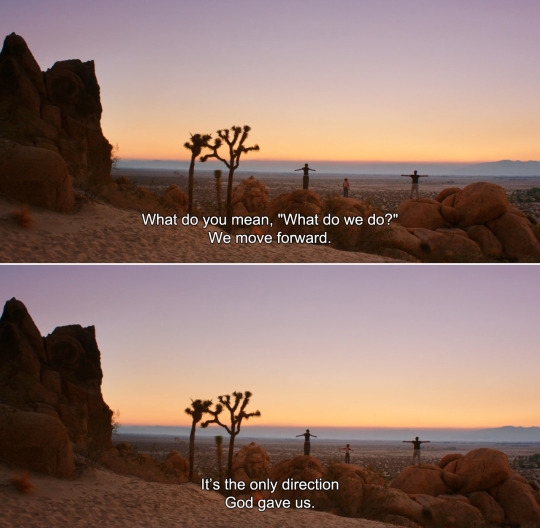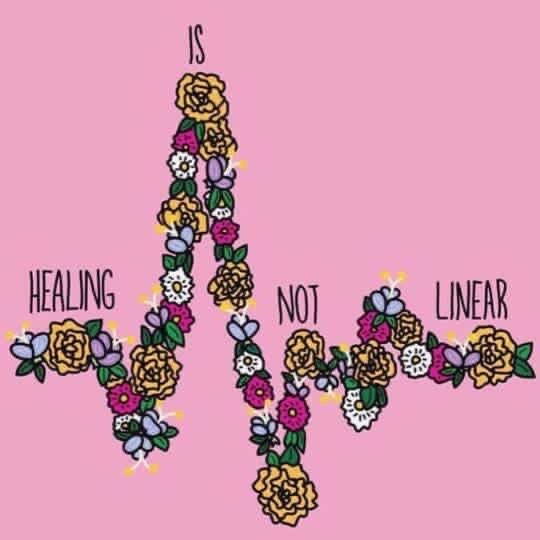Text
SAFAR (Journeying): Part 1
Literally meaning being transported from one place to another, journeying in the language of the Sufis is described as being freed from living a restricted life with carnal or bodily concerns and bounds, and turning to God on the horizon of the heart. It can be viewed and dealt with within the concepts of "journeying toward God," "journeying in God," and "journeying from God."
Turning to God or journeying on His way begins with a person's conscious decision and continues along the bridges of belief, the practice of Islam in daily life, and attaining excellence in one's deeds in awareness that God always sees us and whatever we do. It requires sincerity and purity of intention in faith and the practice of Islam, as well as austerity, asceticism, righteousness, and piety. It continues until the point where the Divine Being, Who introduces Himself to us with the words, We are nearer to him than his jugular vein (50:16), favors the wayfarer, who feels invaded by His love and being attracted by Him and experiences an overflowing zeal toward Him, with special nearness to Him. Those who have reached this point and feel this nearness in their spirit cannot help but utter, "There is no longer any space, neither in the heavens nor in the earth!" Without stopping, they continue their journeying, which has now passed beyond time and space.
Journeying occurs at various levels and forms according to how the initiate has been prepared for it, the extent of his own spiritual capacity and, more than anything else, according to the particular gifts with which the One Who is nearer to everything than itself will favor him.
Journeying begins with reflection on the outer world and the human inner world, and by perceiving God's particular manifestation of His mercy and His assistance amidst His overall manifestations of His Names in the light of belief in Divine Unity, and by feeling this particular manifestation in one's inner world with pleasure. This journey, which can be viewed as journeying toward God, continues with the continuous sipping of Divine knowledge by observing His unique stamp on whatever there is in the universe, from the earth to the farthest galaxies. Initiates making this journey never set their hearts on anything other than God, but spend unending efforts to turn to God in their hearts, continuing their relationships with other things and beings only with respect to the fact that they are, in truth, also indicators of God. As long as they feel the breezes that emanate from this proceeding on the way to God in the depths of their hearts or observe their horizon of being favored by God on their peaks, they feel more and more provoked to rise higher and boil from the depths of their hearts in the virtuous circle of observation and pleasure. This state of theirs can be viewed in the light of the verse, Those who keep from disobedience to God in reverence for Him and piety: when a suggestion from Satan touches them—they are alert and remember God, and then they have clear discernment (7:201). An initiate who has reached this elevated horizon sees, feels, and evaluates everything differently and displays continuous changes from a lower state to a higher one.
In the second stage of journeying, or in the second journeying, initiates free themselves from different pieces of information that have been collected from different sources and proceed toward unity in thought on the horizon of knowledge of God, exhibiting this unity through all their faculties. This stage can be viewed as "journeying in God," and it consists of an initiate's feeling through the Divine Names the Divine Being Himself called by these Names; and his experiencing the protection and direction of the Divine Attributes; and regarding his innate poverty as a means of pride, continuously progressing toward Him on his particular horizon through the perception of his own innate poverty and helplessness. Initiates in this second stage are always aware of Him, are satisfied with their knowledge of Him, voice Him, and experience themselves in His company at all times. Some call this stage journeying in "the company of the Ultimate Truth." Heroes of spirituality who have reached this peak on the horizon of being aware of the Divine Names watch what is beyond through the prism of the Divine Attributes, and cast their nets of spiritual faculties to catch mysteries. Like sunflowers always turning their faces to the sun, with the eyes of their hearts fixed on a certain point on the horizon, and their consciences conducting business with the Divine Being, they act in great awe of the Divine Presence, shuddering at realizations which they feel according to their level. Every one of their states displays the truth voiced in, They do whatever they do and give whatever they give in charity and for God's cause, with their hearts trembling at the thought that they are bound to turn to their Lord. It is those (illustrious ones) who hasten to do all kinds of virtuous deeds, and they are in a virtuous competition with one another in doing them (23:60–61). When they turn their eyes to the sensed existence, they notice the Divine Names; and when they contemplate what exists beyond the sensed existence, they are struck with wonder and amazement.
One drowned in such knowledge of God cannot distinguish between the Names and He Who is called by these Names;
The disciples of the guides of the Order of Jilan are cognizant of such mysteries.
M. Lutfi
9 notes
·
View notes
Text
Most people think Allahu Akbar means "Allah is the greatest." But it actually means something more beautiful. It actually means Allah is greater.
When you repeat it in Salah, it means Allah is greater than whatever else you could be doing or thinking about at this time. When you say it in difficulty, it means Allah is greater than the hardships that surround me. When you say it in sadness, it means Allah is greater than the situation that is hurting my heart. When you say it in your happy moments, it means the Allah who granted me this joy is greater than whatever is making me happy. So whichever situation you say it in, it reminds you that Allah is and will always be greater than anything and everything that exists.
2K notes
·
View notes
Text
Purpose and drive and passion are so important. 2020 has been wild but life has always been a fleeting thing, even during our best times and our best years. Everything passes. It's when our equilibrium is out of sync and our desire for quality of life outweighs our purpose, that things outside of our control become haunting and scary and horrific.
When life throws you out of balance, it's the perfect time to grow. One foot in the realm of order and the other in the world of uncertainty. You can't remain in order forever. It's not good for you. Stagnation kills you like it poisons still water. Perhaps this is why Adam was compelled to eat from the tree. To discover his consciousness, his bayyinah. To move from stillness and into action. To come to a realization that he has to grow, and so he covered himself up.
We were created with a desire to grow and to overcome and to progress. We were made with spiritual ambitions that are higher and more noble than the material world we see around us. It's when we constantly look for quality that we let the material world win. Our heads and our eyes are constantly directed to look up and to wonder throughout the Quran. At the mountains, the skies, the sun and the moon and the stars. When we focus solely on the material, we're looking downwards and into our plates and our pockets. Into the dirt.
We were created from mud but our cognition says that we were meant for something higher. This life is like an hour of a day. But it can be beautiful if we look for the signs. We gotta reconnect with ourselves and in turn reconnect to God. Embrace Allah's Rahma, it's everywhere and it flows through you.
51 notes
·
View notes
Text
CHILA (Suffering): Part 1
Denoting abandonment of all (worldly) pleasures and delights, and the affliction and hardship one bears when overcoming corporeality, chila (suffering) is used to express an initiate's spending at least forty days in strict austerity and self-discipline in the name of spiritual training. During this period, initiates keep to the absolute bare minimum in meeting such bodily needs as eating, drinking, sleeping and speaking, and spend most of their time in worshipping, mentioning God, thinking and self-supervision. As if they had died before dying, they concentrate on death and are annihilated with respect to their carnal self and prepares for a new, spiritual life with the necessary endowment to be persons devoted to God.
Dervishes spend the period of suffering either in a silent corner of a dervish lodge or in a quiet room in their homes. Associated with austerity and even serving to fulfill some of its functions, suffering is an attempt to gain nearness to God or an active expectation of meeting with Him in the spirit. The original word used, chila in Persian and arba'in in Arabic, means forty, because such a period lasts at least forty days, although it may last less or more than forty days. It may even occur that the dervish feels obliged to suffer the whole life long in order to surmount the animal aspect of his or her nature. Regarding all hardships that dervishes suffer in God's way as His precious gifts, they like life more as its griefs and hardships increase, and they welcome afflictions in the delight of living a conscious, deeply felt life. Some people of the heart consider misfortunes as Divine favors presented in that form, and desire more. Fuduli expresses his thoughts in this respect in the voice of Majnun as follows:
Never reduce Your grace on people of affliction;
That is, make me addicted to more and more misfortunes.
Jalal al-Din al-Rumi likens suffering and afflictions to a guest knocking on our door every morning and stresses that the dear guest should be welcomed and entertained:
Every moment a grief comes upon your heart like a dear guest.
When that emissary of grief visits you, welcome it as a friend;
In fact, it is not a stranger to you, for
You and it are acquainted.
Ibrahim Haqqi voices the same thoughts, dressing them in the style of his age:
If grief and melancholy come upon your heart,
Suffer it and know that it is acquainted with you.
If anything occurs to you from the Truth,
Accept it with warm welcome.
Sorrow is a guest, entertain it, so that
God may find you welcoming every misfortune.
............
Hold not back from affliction so as not to become unmanly;
Many people relying on God are happy with affliction.
Ashrafoghlu Rumi advises that poison should be accepted as if it were honey or sugar:
Ashrafoghlu Rumi, this is what behoves those who love the Beloved,
They should swallow poison as if it were sugar for the sake of the Friend.
In this way, it is essential to be very welcoming toward misfortunes, and to welcome with the same contentment whatever comes from God-good or bad, happiness or suffering. Moreover, there are some other principles which dervishes should observe during certain periods of suffering that they spend in retreat.
Suffering, which usually lasts for forty days, is the most direct way for travelers to God who are in pursuit of lofty ideals to purify their minds and hearts and to deepen in thought and feelings in consideration of the world beyond, and to rise to the level of life in the horizon of the heart and spirit where they will share the same aura with spiritual beings. Suffering exists in all the heavenly or unheavenly religions and religion-like spiritual systems; it is necessary in order to discover the innate power of the spirit. But here we will not discuss that aspect of it, which rather concerns mystical movements and parapsychology.
Muslim Sufis base their consideration of suffering on the forty days which the Prophet Moses spent on Mount Sinai before being addressed by God (see, the Qur'an 2:51; 7:142). They also refer to the forty years the Children of Israel had to spend in the desert of Sinai as a punishment for their refraining from fighting and as a preparation for their future life. In Christianity, there is the time of Lent (a period of forty days before Easter), which shows that suffering is common to almost all religions and religion-like systems. Furthermore, even if it only lasts ten days, retreat into a mosque without going out during the last ten days of Ramadan for the purpose of more devotion can also be considered as having some relation with suffering.
In the Muslim, Christian and Jewish worlds, and in different schools of thought in Islam, there have always been retreat and seclusion for the purpose of spiritual refinement and training. While such refinement and training have been performed in special rooms of retreat and seclusion, called houses of suffering, followers of others religions have performed the same in the seclusion of their places of worship.
Dervishes are taken into a retreat or a house of suffering by their spiritual guide. There they live alone, eating, sleeping, and speaking little, and spending most of their time in worship. They hold themselves under strict control and self-supervision, continuously breathing life into the heart, and traveling in the mind between their inner world and the outer world. Wholly dedicated to attaining a purely spiritual life, they try to feel the Lord with all their being and to see beyond the door half-opened on the heart. Endeavoring to discern and attain unity, they fear missing any signs of the Divine manifestations that may dawn on the hills of the heart. They express the limits of their capacity and the insufficiency of their will-power with sighs of poverty and helplessness, and become more hopeful with their reliance on the limitless Power of the Truth. When left with no means at all, they expect to be surprised by the opening of a door, and unburdens themselves to their Lord, Who sees everything, in the manner of a poor beggar, saying:
Be kind to me, O my Sovereign, do not abandon favoring the needy and destitute!
Does it befit the All-Kind and Munificent to stop favoring His slaves?
1 note
·
View note
Text
WAQT (Time)
In the language of Islamic Sufism, waqt (time) denotes the time when the Divine gifts pour on a traveler to the Truth in accordance with one's nearness to Him. These gifts invade the inner world with their Divine quality according to one's capacity to receive them in the frequencies particular to them. If the gifts come with an air of fear and sorrow, the traveler becomes as an embodiment of fear and sorrow; if they come with the air of rejoicing and exhilaration, then breezes of peace and joy begin to blow in one's world of feelings, without causing loss of self-possession.
One who is conscious of the Divine origin of the gifts may express resignation with such words as "Your favor is welcome, and so is Your resentment." One acts in peace and contentment and tries to attain confidence in the valleys of reliance, surrender and commitment. Negligence of what is necessary for a traveler to do in order to hunt these gifts that come from the Truth-for example, neglecting to do what falls to the free will in order to obtain a desired result-is a fault on the part of the saintly ones, who have reached the ranks of perfect godliness and nearness to God. Since this means that the heart has lost some degrees in its relation with God, the Truth, the traveler is punished according to his or her rank. Those who have risen to a certain rank are expected to use all their time in the most profitable way possible, and to try to strengthen their relation with the Almighty and multiply their rewards. It is because of this that a Sufi is called "a child of time."
Being "a child of time" means that initiates always consider what they must do at all times and, doing what is best in God's sight, use all times and opportunities given by God as if each were a seed capable of producing seven or seventy or seven hundred grains. This also means fixing one's eyes exclusively on God and always turning expectantly and hopefully to the source from which the Divine gifts come. Also, one makes one's will dependent on God's Will. The beginning of this rank, marked by an initiate's spiritual state and pleasure, is time and its end is the intersecting point of being contained and not contained in time and place. We can also view it as the projection onto an initiate's heart of the Messenger's rank-he reached the highest point predestined for him, a point at which he became so close to God that there was left only the distance between the strings of two bows adjacent to each other or even less (53:9). Mawlana Jalal al-Din al-Rumi indicates this as follows:
A Sufi is an example of how one can be a child of time;
But as for a purified saintly scholar, he is free from both time and state.
The periods of time when the Prophets, purified saintly scholars, and saints, are sent to the world, charged with special duties, and honored with the reward of their efforts, are the periods when the doors to the Divine gifts are wide open and the world is enlightened and honored by the Divine Light. Those periods, and every part of the Age of Happiness, that is, the Time of the Messenger, in particular, are regarded as the Days of God in proportion to the density and extent of radiation of the lights those holy people diffuse. On the other hand, time gets darker in proportion to the fading of the enlightening thought that they diffuse and in proportion to the world's being deprived of this thought.
If the Almighty wills that His servants who are traveling on His way be favored and embraced with mercy, He strengthens them with time, making it a ladder for them to climb beyond time, or enabling them to do many useful things in a short time, things that would be impossible in a normal timeframe. If, by contrast, He wills to throw those who stray from His way into loneliness and boredom, He wraps time in evil for them and allows them to wander on the slopes of time in a dark, barren land that is closed to the Truth. We call this barren part of time "time" only in order to make a comparison. Otherwise, time is a gurgling stream that continuously flows into the observatories where God's acts are observed.
The true heroes of time have always taken the present day into consideration and tried to use it in the best way possible. They take the previous and the following days into account, but only from the viewpoint of their being the beginning and end of the present day; they regard the previous day as the basic element of the fabric of our lives and the following one as the weft. As for those foremost in nearness to God who live as if beyond the limits of time, they make use of all of time, they have assigned time to God in such a mysterious way that according to the famous adage One who does not taste, does not know, we cannot perceive it. Those people who do not live on the same horizon can neither grasp the showers of gifts with which they have been favored nor understand the profundity of their knowledge of God and the depth of the spiritual pleasures they taste. As time serves like rain pouring down from the heavens and a fertile field bursting with vegetation, they sometimes think of the past favors of God and increase their devotion to Him, saying, "Should I not become a thankful servant?"; sometimes they speak to themselves of such feelings of gratitude and are immersed in waves of gratitude. Their responsibilities always bring them good and blessings, and the good and blessings they receive lead them to more gratitude.
By virtue of being conscious of the source of the favors and understanding the main reason lying behind the compliments, an initiate experiences pleasures beyond all understanding and begins to perceive punishments as if they were favors. Though such a degree of favor may open the door for some people of certain disposition and temperament to free and easy behavior and the utterance of proud words that are incompatible with the rules of Shari'a, those who travel on the way to God guided by the Sunna of the Prophet always behave with self-possession. In obedience to the Divine commandments, they adorn their nearness to God with utmost respect for and awe of Him; they fly in the depths of the heaven of sainthood on the wings of knowledge and the knowledge of God. Attributing to God alone whatever favors they may receive and whatever achievement they may realize, their lofty ranks will never prevent them from the utmost humility. Traveling from state to state, they drink gifts sip by sip from the bowl of self-possession.
For others who can take one more step forward, things and events no longer become visible, the past and future are confused, and time melts away in the infinity of the absolute Owner of Time and completely disappears from their view. Traveling in such a mysterious valley, they taste the pleasures of seeing everything annihilated in God and, in the face of the scene which things and beings display under the overall manifestations of God's Names, they feel wonder, absorbed in turning to God and amazement at His signs and acts. They even take the manifestations of His Names and Attributes for His manifesting Himself in visible forms or in nature or other things. This mood is the point where an initiate may become confused in the world of his or her feelings, thoughts and pleasures. Some people of different temperaments may, as mentioned above, confuse God's manifestations of His Names and Attributes with His manifesting Himself in different forms, and see a drop as if it were an ocean, a particle of light as if it were the sun, nothing as if it were everything, and utter such words as: "I am the true One; How exalted my being is!"; "There is nothing that exists save God;" and "There is nothing that truly exists save God."
We should point out that the fact that everything is from Him and is sustained by Him does not mean that nothing else exists, or that everything is not different from Him, or that everything is identical with Him. If things and events are not viewed and analyzed in the light of the Prophetic Message and with an insight and consciousness based on it, and if the spiritual journey is not based on self-possession and discernment (between truth and untruth, origin and shadow, God and His acts and works), it will be difficult for people of certain disposition and temperament to be freed from such confusions.
O God! Guide us to the Straight Path, the path of those whom You have favored.
May God's peace and blessings be upon our master Muhammad and on his family and all of his Companions!
4 notes
·
View notes
Text
ISLAM 101: Your Faith.Part6
Belief in the Angels
The Meaning of Belief in Allah’s Angels
This means firm belief that they exist, that they belong to the unseen world, not our world, and that they are honoured and pious servants who worship Allah as He deserves to be worshipped, execute His commands and never disobey Him.
The Qur’an says about them, “They are honoured servants. They do not precede Him in speech and they act on His command.” (Soorat Al-Anbiyyaa’, 21:26-7)
Belief in them is one of the six pillars of eemaan (faith), as the Qur’an states, “The Messenger believes in that which has been revealed to him from his Lord and so do the believers. Each one believes in Allah and His angels and His books and His messengers.” (Soorat Al-Baqarah, 2:285)
When the Prophet May Allah’s peace and blessings be upon him was asked about faith, he said, “It is to believe in Allah, His angels, His books, His messengers, the Last Day and to believe in the divine decree, the good and the bad of it.” (Saheeh Muslim: 8)
What Does Belief in the Angels Include?
1) Belief in their existence: We believe that Allah made them from light and created them with a natural predisposition to worship and obey Him.
2) Belief in those angels whose names have been mentioned to us, such as Jibreel (Gabriel) u. We also generally believe in all those whose names have not been mentioned to us.
3) Belief in their attributes that have been mentioned to us. These include the following:
• They belong to the unseen world whom Almighty Allah created solely for His worship. They have no divine attributes whatsoever and are naturally disposed to show complete obedience to Allah, as the Qur’an states, “They do not disobey Allah in respect of any order He gives them and carry out what they are ordered to do.” (Soorat At-Tahreem, 66:6)
• Allah created them from light, as evidenced by the hadeeth, “The angels were created from light.” (Saheeh Muslim: 2996)
• They have wings, as the Qur’an states, “All praise is due to Allah, the Originator of the heavens and the earth, who made the angels messengers with two, three or four pairs of wings. He increases in creation what He pleases; surely, Allah has power over all things.” (Soorat Faatir, 35:1)
4) Belief in the duties which have been mentioned to us and which they carry out with Allah’s command. These include:
• The angel charged with the task of conveying Allah’s revelation to His messengers, namely, Jibreel (Gabriel) u.
• The angel charged with the task of taking away the souls of those destined to die, namely the Angel of Death and his assistants.
• The angels charged with the task of recording all the good and bad deeds people do, known as the Noble Scribes (al-kiraam al-kaatiboon)
Benefits of Belief in the Angels
Belief in the angels has numerous benefits in the believer’s life. These include the following:
1) Being aware of Allah’s absolute strength and power: The magnificent and great creation of the angels clearly testify to the greatness of their Creator. The fact that Allah I created the mighty angels from light and with wings makes us appreciate His attributes with the importance and appreciation that He deserves and revere Him even more.
2) Observing righteousness: The firm belief that some angels record all our deeds prompts us to fear Allah I and to try not to disobey Him, whether we are alone or with others.
3) Observing patience while carrying out our duties towards Allah: When we become aware of the infinite number of angels in this vast universe who obey Allah and constantly worship Him, along with us, as He should be worshipped, we become prompted to endure all the adversities in carrying out our duties towards Allah. We also experience a great feeling of joy and reassurance.
4) Showing gratitude to Allah: The fact that Almighty Allah has created some angels whose task is to guard people against harm prompts us to thank Him for His divine care.
Belief in the Divine Books
The Meaning of Belief in the Divine Books
The Holy Qur’an is written with great skill and precision, based on strict calligraphy rules.
This means firm belief that Almighty Allah has sent down some divine books to some of His messengers, and that they contain the speech of Allah which must be thought of in a manner that suits His majesty. These books also contain the truth, light and guidance for people in both this world and in the hereafter.
Belief in the divine books is one of the six pillars of faith, as the Qur’an states, “O you who believe, believe in Allah and His Messenger and the Book which He has revealed to His Messenger and the Books which He revealed before.” (Soorat An-Nisaa’, 4:136)
In this verse, Almighty Allah commands the believers to believe in Him and His Messenger and the book which He revealed to His Messenger r, namely, the Qur’an. He also commands them to believe in all the books He revealed before the Qur’an.
Defining faith (eemaan), the Prophet May Allah’s peace and blessings be upon him once said, “It is to believe in Allah, His angels, His books, His messengers, and the Last Day and to believe in the divine decree, both good and bad.” (Saheeh Muslim: 8)
What does Belief in the Divine Books Include?
1) To believe that they were truly revealed by Allah.
2) To believe that they contain the speech of Allah May He be glorified and exalted.
3) To believe in the divine books which Almighty Allah has named, such as the Qur’an, which He revealed to our Prophet Muhammad May Allah’s peace and blessings be upon him, the Torah (At-Tawraah) which He revealed to Moses (Moosaa) u and the Gospel (Al-Injeel) which He revealed to Jesus (‛Eesaa) u.
4) To believe the authentic stories mentioned in them. The Unique and Distinctive Characteristics of the Qur’an
The Holy Qur’an is the Speech of Allah, which He revealed to our Prophet Muhammad May Allah’s peace and blessings be upon him. Therefore, we ought to venerate it, read it, ponder its verses and strive hard to abide by its instructions.
Suffice it to say that the Qur’an is our guide in this life and will be the cause of our salvation in the hereafter.
The Holy Qur’an has numerous unique features which distinguish it from the other revealed books. These include the following:
1) The Glorious Qur’an provides a summary of divine rulings. It also came to support and confirm the command to worship Allah alone contained in the previous divine books. The Qur’an says, “And We have revealed to you the Book with the truth, confirming the books before it and with final authority over them. (Soorat Al-Maa’idah, 5:48)
This verse makes it clear that the Qur’an agrees with and confirms the truth, statements and beliefs, amongst other things, contained in the previous divine books and serves as a witness over them.
2) All people, regardless of their language or race, must adhere to the Qur’an and act according to its dictates, no matter how far removed they may be from the time the Qur’an was revealed, as opposed to the previous scriptures which were revealed for particular peoples at specific times. The Qur’an says, “This Qur’an has been revealed to me so that I may warn you by it, and anyone else it reaches.” (Soorat Al-An‛aam, 6:19)
3) While many additions and deletions have crept into the other divine books, the Qur’an has remained intact because Allah the Almighty has taken it upon Himself to protect it, as the Qur’an says, “We have sent down the Reminder, and We will surely guard it [from corruption].” (Soorat al-Hijr, 15:9)
What is Our Duty Towards the Qur’an?
-We must love and venerate the Qur’an. We must also value its importance because it is the speech of Almighty Allah I, which is unquestionably the best and most truthful speech.
-We must read it, recite it and ponder its verses. We must also reflect on its spiritual guidance, statements and stories and take it as a criterion in our lives whereby we distinguish between truth and falsehood.
-We must act on its dictates, obey its commands and make them our way of life.
When ‛Aa’ishah ~, one of the Prophet’s wives, was asked about the character of the Prophet r, she replied, “His character was the Qur’an.” (Musnad Ahmad:24601; Saheeh Muslim: 746)
In other words, the Prophet r was the practical embodiment of the Qur’anic injunctions in all his actions and worldly life. Indeed, he followed the guidance of the Qur’an in its entirety and provided an excellent example for us to follow, as the Qur’an states, “You have an excellent model in the Messenger of Allah, for all who hope for Allah and the Last Day and remember Allah much.” (Soorat Al-Ahzaab, 33:21)
What is Our Stance regarding the Contents of the Previously Revealed Books?
A Muslim believes that the Torah, which was revealed to Moses u, and the Gospel, which was revealed to Jesus u, were the truth from Allah May He be glorified and exalted. He also believes that they comprised rulings, guidance and lessons and news which had guidance and light for people in their worldly life and the life to come.
A Muslim believes that the Torah and the Gospel were revealed by Allah I but that many additions and deletions have crept into them. Therefore, he believes only those statements in them which agree with what is mentioned in the Qur’an and the Prophet’s traditions.
However, Almighty Allah informs us in the Holy Qur’an that the People of the Book, that is the Jews and the Christians, had distorted their divine books through alteration, omission or addition to the original text, and are thus not as authentic as Allah first revealed them.
The Torah, that is available today, is not the same Torah revealed to Moses u, because the Jews corrupted the original text by altering it and changing numerous rulings in it, as the Qur’an states, “Some of the Jews distort the true meaning of words.” (Soorat An-Nisaa’, 4:46)
Similarly, the Gospel available to us today is not the same Gospel revealed to Jesus u, for the Christians distorted it and altered a large number of its rulings. Concerning this, the Qur’an says: “Among them is a group who distort the Book with their tongues so that you think it is from the Book when it is not from the Book. They say, ‘It is from Allah,’ but it is not from Allah. They tell a lie against Allah and they know it.” (Soorat Aal ‛Imraan, 3:78)
“We also made a covenant with those who say, ‘We are Christians,’ and they too forgot a good portion of what they were reminded of. So We stirred up enmity and hatred between them until the Day of Rising when Allah will inform them about what they did.” (Soorat Al-Maa’idah, 5:14)
The Holy Bible available to the People of the Book today, which consists of the Old Testament and the New Testament, has numerous wrong beliefs, misleading misconceptions and false statements and stories. We believe those statements and reports which are shown by the Qur’an or the sound Sunnah to be true, and we disbelieve those ones which are shown by the Qur’an and Sunnah to be false. As for the rest of the statements and reports, we must neither believe nor disbelieve them, because they are not proven in the Qur’an or Sunnah to be either true or false.
Despite all this, a Muslim ought to respect these books and must not demean or desecrate them, for they may still contain some of Allah’s speech which has not been distorted.
Benefits of Belief in the Divine Books
Belief in the divine books has a number of benefits, including the following:
1) Awareness of Allah’s great care and immense mercy for His slaves for sending for every people a divine book to guide them, help them achieve happiness in this life and enjoy eternal bliss in the hereafter.
2) Awareness of Allah’s absolute wisdom contained in his laws, for legislating for every people what perfectly suits their general circumstances and personalities, as the Qur’an states, “For each [community to which a Messenger was sent with a Book] have We appointed a law and a practice.” (Soorat Al-Maa’idah, 5:48)
3) Showing gratefulness to Allah for sending down such books which contain light and guidance for us in this life and in the hereafter. Indeed, this is a great blessing for which we ought to offer thanks to Allah.
2 notes
·
View notes
Text
It's funny how we used to think destroying ourselves for the ones we love most was the most romantic and ideal way to love someone. You know you've grown when you get what I mean.
1K notes
·
View notes
Text
Let’s talk about something called the “sunk cost fallacy”.
Say that you’ve bought a concert ticket for $50 for a band that you don’t know that well. Half an hour into the show, you realize that you don’t actually enjoy the music and you aren’t having a good time - instead of leaving the concert to go do something else, however, you sit through the remaining hours of the concert because you don’t want to “waste” the cost of the ticket.
Congratulations, you’ve just fallen victim to the sunk cost fallacy.
The “sunk cost fallacy” is something that all humans are prone to when we make decisions. Simply put, it’s the human tendency to consider past costs when we make choices, even when those costs are no longer relevant. When you’re deciding whether or not to stay at that concert you aren’t enjoying, you will likely consider the cost of the ticket when you’re making your decision - for instance, you’d probably be a lot more willing to leave a $5 concert that you aren’t enjoying than a $50 concert that you aren’t enjoying. But taking the cost of the ticket into account at all is a mistake.
When you’re making a rational decision, the only thing that matters is the future. Time, effort and money that you’re spent up until that point no longer matter - it doesn’t make sense to consider them, because no matter what you decide, you can’t actually get them back. They are “sunk” costs. If you decide to stay at that concert, you are out $50 and you’ll have a mediocre evening. If you decide to go leave and do something more fun, you are out $50 and you’ll have a better evening. No matter what you choose, you have lost $50 - but choosing to leave the concert means that you haven’t also spent an evening doing something you don’t like.
The sunk cost fallacy is sometimes also described as “throwing good money after bad” - people will waste additional time, resources and effort simply to justify the fact that they’ve already wasted time, resources and effort, even if it leaves them worse off overall.
Common examples of sunk cost fallacy in everyday life include:
refusing to get rid of clothes that don’t fit or that you never wear because they were expensive
going to an event that you no longer want to go to because you already bought the ticket
spending more and more money on repairing a car or computer (or something else that depreciates in value over time) instead of buying a new one because you don’t want to waste the money you put into earlier repairs
continuing to watch a movie or TV show you aren’t enjoying anymore because you’ve already watched part of it
finishing a plate of food that you’re not enjoying or are too full to enjoy, because you don’t want to waste it
refusing to get rid of unused, unwanted or broken items in your home because the items were expensive
Perhaps the most damaging example of sunk cost fallacy in everyday life, however, is relationships.
People often use the length of a relationship to justify staying in it. You’ve probably heard this logic - you may even have used it yourself:
“I can’t break up with him or the two years we spent together will be for nothing.”
“If I leave her, it will mean I wasted the five years I spent with her.”
The reality, though, is that staying in a mediocre relationship doesn’t “give you back” the time you’ve already invested in that relationship. It just makes the relationship longer. If you stay in a bad relationship for five more years to avoid “wasting” the first two, you haven’t actually made those first two years worthwhile - you’ve simply spent seven years of your life in a bad relationship. There’s nothing we can do to recover time and effort (and in most cases, money) that we’ve already spent. But we can forgive ourselves, and we can stop letting our past mistakes continue to define our futures.
47K notes
·
View notes
Photo
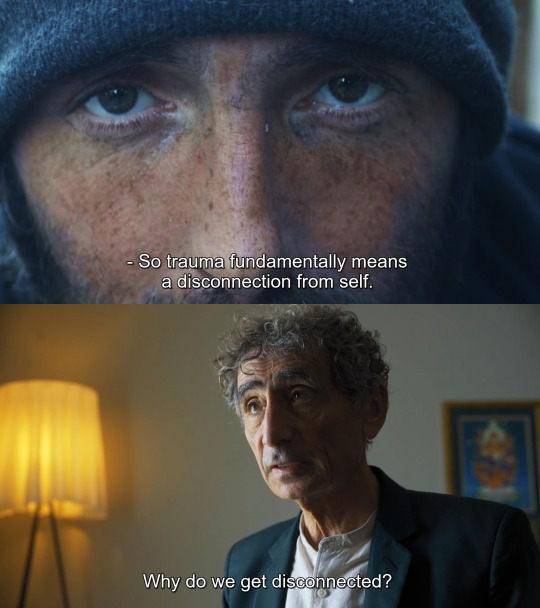
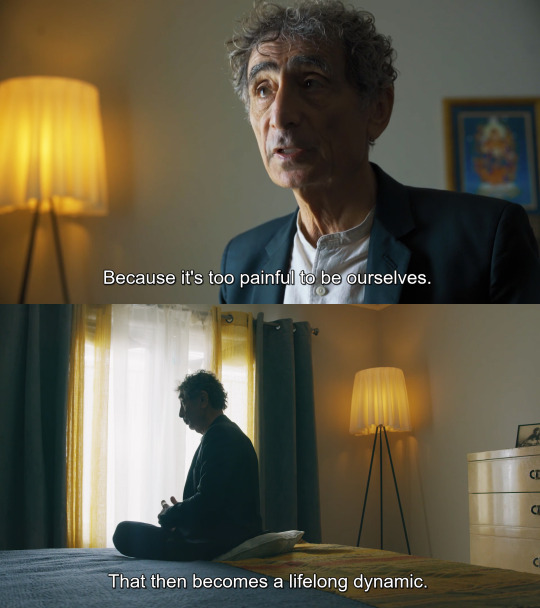
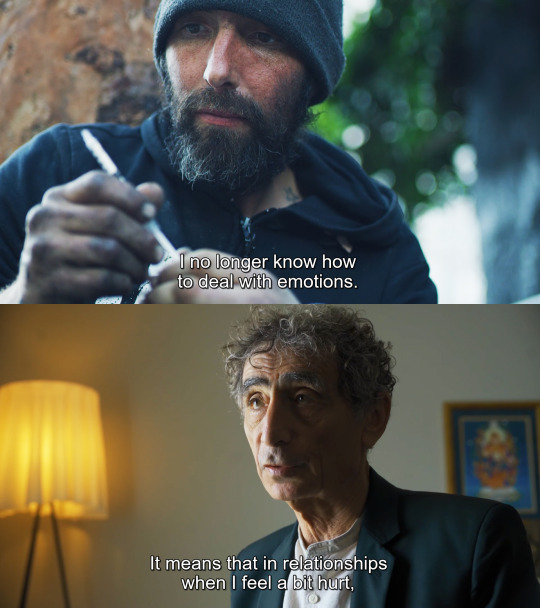
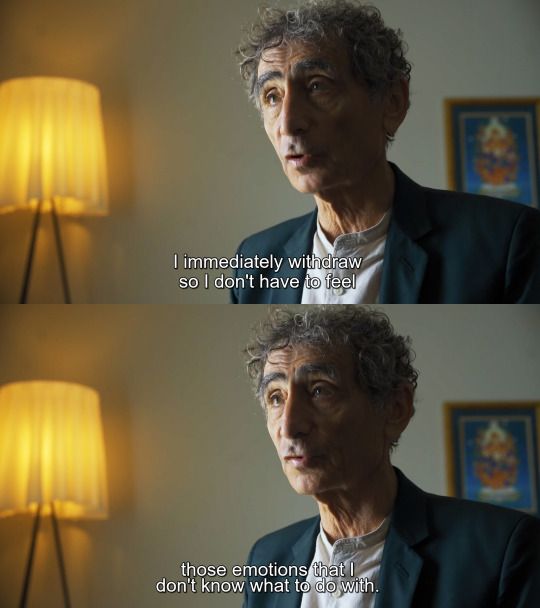
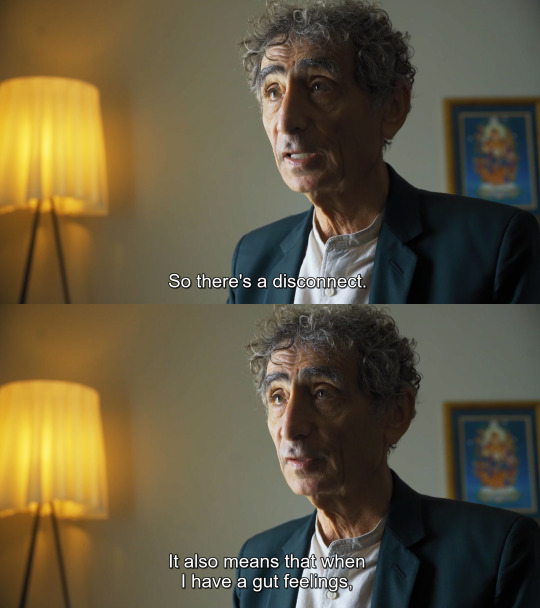
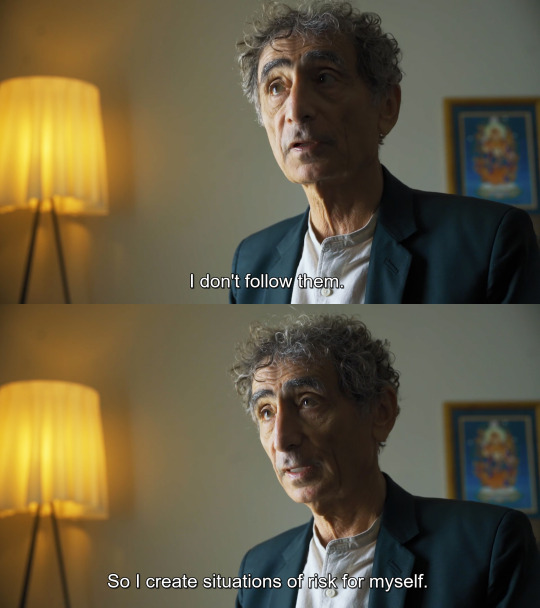
The Wisdom of Trauma (2021) dir. Maurizio Benazzo, Zaya Benazzo
#The Wisdom of Trauma#Gabor Mate#Gabor Maté#Maurizio Benazzo#Zaya Benazzo#Wisdom of Trauma#trauma#psychology#wisdom#documentary#watched this tonight
13K notes
·
View notes
Text
your desired life is the natural state

imagine living in a society where no one gets compared to each other. where we value the uniqueness of beauty instead of setting some 'objective standard'. where we're encouraged to support other people's achievements instead of being jealous of them. where we know that someone else's win doesn't mean our failure. where we know someone else's wealth doesn't mean our lack. imagine a society where competition is not a thing. we're all just blossoming at our own speed and we value our uniqueness.
this is not a description of a utopia. it's a description of our society in its healthy form, without any dis-eases.
if you'd be raised in a society like that, it's only natural that your self-concept would be immaculate. and we all know that even though self-concept doesn't have to be the key to every manifestation, it is a powerful tool for living an amazing life and pretty much a magnet for your dreams. in a society like this, we all would be living the lives of our dreams.
the primary and even secondary socialisation formed us into the character we're playing every day, our persona. they deeply affected how we see ourselves, the world and life. when you had no idea that you are the one who has full power over your life, you allowed society to form you. but take a look at whom you let from you. our society is unfortunately in many ways still wounded. so it could only form you into a wounded person too.
if you still have any feelings of guilt for manifesting things for yourself, don't let them get you. they're still coming from that wounded mindset that is based on competition and lack. but life is not really like that, we just let society get those lies into our heads. nature itself is proof that this world is built from abundance. look at the infinite blue sky above your head, how can you say where it starts and where it ends? look at a forest, how long would it take you to count all of the leaves or needles on every tree in that forest? and god how many forests are there on earth? look at your own body, you see one body but how many cells are there within you? could you count them even if you could see them?
don't let anyone or anything belittle your infinity. it's your birthright. but at the same time don't resent society for raising you in this mindset. it's still wounded and i'm afraid it has never been really healthy. and after all, it's us who create our society. so the best thing that we can do is not let it affect us anymore and normalise our dream lives for ourselves as well as for others. i don't want this to sound like some manifesto or something, but in a way, we are pioneers for a better future. the bigger is the number of people living their dream lives, the happier is the society as a whole. so don't feel guilt, it's ridiculous.
idk what this turned into, but yeah 😬
love you guys 💗
196 notes
·
View notes
Text
malleable mind, malleable reality

i am stretching my mind to allow my reality to work the way it's naturally supposed to: always in my favour. i am open to instant occurrences. i am open to a brand new start. i am open to experiencing my reality in a brand new way. i am letting the law work in its full capacity. i am throwing logic out of my mind. destroying it. burning it. i am letting go of all of the old stories, old beliefs, old restrictions. from the beginning, they were just illusions.
all there is is me. brand new. with a stretched mind. open to all of the wonders of the law. open to expanding on what is possible. ready to have what is mine. ready to experience my full power as a god. ready to use my birthright.
all there is is now. all there is is the full primordial power of the law. and my mind is open to it. my mind is taking the power as its own. my mind is hungrily accepting all of the power, all of the possibilities. letting it all soak in.
i am the infinity.
i recommend reading this in a more meditative state. just be calm, ponder on the words, feel their heaviness and truth and saturate your mind in them.
1K notes
·
View notes
Text
Purpose and drive and passion are so important. 2020 has been wild but life has always been a fleeting thing, even during our best times and our best years. Everything passes. It's when our equilibrium is out of sync and our desire for quality of life outweighs our purpose, that things outside of our control become haunting and scary and horrific.
When life throws you out of balance, it's the perfect time to grow. One foot in the realm of order and the other in the world of uncertainty. You can't remain in order forever. It's not good for you. Stagnation kills you like it poisons still water. Perhaps this is why Adam was compelled to eat from the tree. To discover his consciousness, his bayyinah. To move from stillness and into action. To come to a realization that he has to grow, and so he covered himself up.
We were created with a desire to grow and to overcome and to progress. We were made with spiritual ambitions that are higher and more noble than the material world we see around us. It's when we constantly look for quality that we let the material world win. Our heads and our eyes are constantly directed to look up and to wonder throughout the Quran. At the mountains, the skies, the sun and the moon and the stars. When we focus solely on the material, we're looking downwards and into our plates and our pockets. Into the dirt.
We were created from mud but our cognition says that we were meant for something higher. This life is like an hour of a day. But it can be beautiful if we look for the signs. We gotta reconnect with ourselves and in turn reconnect to God. Embrace Allah's Rahma, it's everywhere and it flows through you.
51 notes
·
View notes
Text
“I wanted him in the bluntest way. I wanted his lips, his hands, his arms. I wanted him the way the ocean wants the shore, constantly reaching and running back. I wanted him the way rain wants to fall, the way the sun wants to shine, the way words want to be read. I wanted him to infinity, to the millionth degree. No amount of rain could douse the fire I had in me for him.”
—
15K notes
·
View notes
